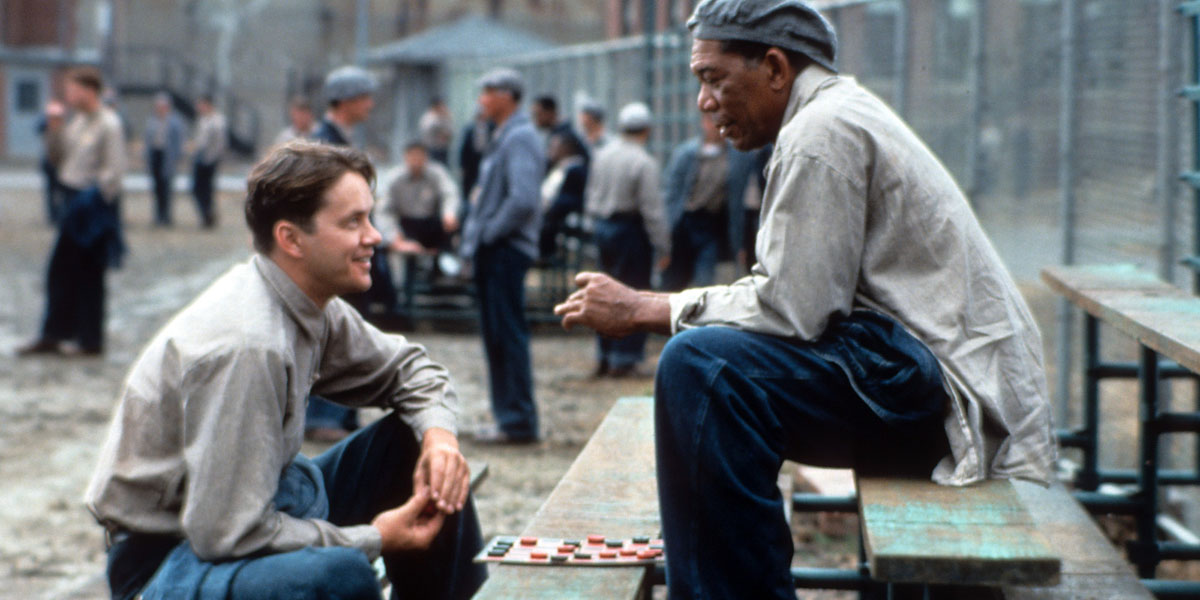Why are we all so fascinated with prison and prison culture? Is it curiosity of the unknown? Or, does the appeal of prison dramas say something more telling about our society as a whole?
Whatever our reason for watching, networks and movie studios keep making prison dramas because people like you and me keep tuning in or paying money to see them. Maybe they know something we don’t; like perhaps we tune into these prison dramas because we are inadvertently satisfying some deep-seated need to understand a growing subset of our society. Relevant nor not, we often get more than we bargain for with our entertainment as with these prison dramas we are often bombarded with traumatizing imagery and disturbing truths about the dysfunction in our prison systems. Still we watch.
Shawshank Redemption
One of the most critically acclaimed movies of all time, just so happens to be the 1994 prison drama Shawshank Redemption starring Morgan Freeman and Tim Robbins. Not only was Shawshank Redemption a poignant look into prison life, but it was also one of the best told stories of friendship. And though both actors delivered a convincing performance of a budding friendship, the writer and screenplay writer—Stephen King and Frank Darabont, respectively—also deserve most of the credit for a story that was clearly written to evoke emotion and sympathy. How could it not, given the setting circumstances?
Prison is a harsh reality for many individuals in our society and Shawshank Redemption touched on many of those harsh realities about our justice system and prison life/culture, albeit slightly romanticized by Hollywood. True, there were other notable prison flicks prior to Shawshank Redemption, such as Cool Hand Luke and Escape from Alcatraz that shed light on our prison systems, but none had been so revered for making an impression and changing lives. Even still, it wasn’t until the late 90s when a highly dramatic MTV show gave way to a whole new generation of prison culture obsessed individuals.
Scared Straight
Possibly one of the most traumatizing TV shows to EVER exist was MTV’s prison drama Scared Straight—not to be confused with the documentary about prison life/culture of the same name that was released back in the late 70s. If you’ve never heard of Scared Straight or never saw the original TV show, just know that it was known for its abrasively realistic depiction of prison life. Despite what audiences saw and heard, one of the primary goals of the show was not to just salaciously traumatize for the sake of it, but rather to educate.
In each episode, real life inmates who were locked up for various types of crimes, would give a heartfelt lecture to kids going down a dangerously similar path, in an effort to prevent those kids from ending up in prison just like them. But the inmates didn’t stop there. The juvenile delinquents were not only forced to listen to the lectures, but also were treated to and had to endure “in your face” chastising from the hardened criminals.
It should go without saying that no one was hurt doing the filming of Scared Straight; at least not physically. Despite the much needed reality check that Scared Straight provided, for some voyeurs of the shows, it only further fueled a fascination with prison life and culture; which then undoubtedly contributed to the creation of more prison inspired dramas on television. After all, the networks follow the money.
Glorification Instead of Education
Since Scared Straight, we’ve seen a steady increase in the number of prison related dramas, particularly on television. This further perpetuates a glorification of power struggles; one that uses the tough prisoner as a surrogate for us in situations in which we may be powerless ourselves. It also deflects from the opportunity to educate about why a life of crime should not be desired. Instead, viewers are subliminally taught to behave in a similar manner. As a result, the mere prevalence of prison dramas in our movies and on TV continues to impact more lives.
Big cable networks like HBO have especially benefited from the glorification of prison dramas as evident in shows like Oz. But they aren’t the only ones. Other networks have gotten in on the act as well, such as FOX’s former TV show Prison Break and Netflix’s current hit Orange is the New Black.
With so many shows about our prison system, you would think that it would be a deterrent, contributing to a decline in the prison population as a result. Actually, the exact opposite is true. In fact, every year more and more prisons—super maximums included—are being built to house more criminals; which lends to an unfortunate truth about our society. The fascination with prison life/culture visa-a-vie prison dramas is just that; a fascination. No one really cares.

